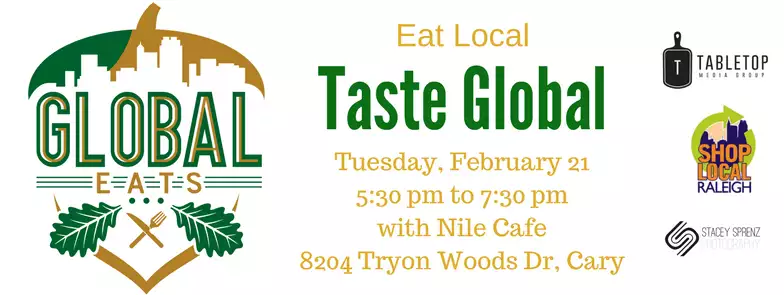Global Eats is back for 2017! This month we take our taste buds to the Mediterranean with Nile Café! Join us February 21, from 5:30pm to 7:30pm, at Nile Cafe in Cary for Mediterranean cuisine!
 Nile Café, located at the Tryon Woods Shopping Center in Cary, opened September 2016. This local Mediterranean restaurant is family owned by a husband and wife duo.
Nile Café, located at the Tryon Woods Shopping Center in Cary, opened September 2016. This local Mediterranean restaurant is family owned by a husband and wife duo.
Ehab Hassan and his wife, Sahar are from Egypt but have lived in the United States for over 30 years. In 1993 they moved to North Carolina from New York to get a fresh start raising their family.
While growing up in Egypt, Hassan described eating meals with family for breakfast, lunch and dinner. A common theme from his early life was cooked from scratch meals with fresh ingredients, a theme that he emphasizes at the Nile Café.
For many years, Ehab and Sahar developed their own recipes, sharing with friends and family along the way. After much encouragement, the Hassan family opened up the Nile Café to share the joy their food brings to so many.
Nile Café’s menu offers some stable dishes from across the Mediterranean (and some Hassan’s favorites), including Koshari, Pastitsio, Mousaka and Tagon Lahma. Add in the made from scratch hummus, baba ghanouj and handmade grape leaves and you’ll have an authentic Mediterranean meal right here in NC.
History of Mediterranean Cuisine
 Unlike many other ethnic cuisines, Mediterranean cuisine is defined by cultural interaction throughout the region’s history. Africa, Asia and Europe meet at the shores of the Mediterranean, creating a geographic region destined to become a major trading hub for many, diverse civilizations across all three continents.
Unlike many other ethnic cuisines, Mediterranean cuisine is defined by cultural interaction throughout the region’s history. Africa, Asia and Europe meet at the shores of the Mediterranean, creating a geographic region destined to become a major trading hub for many, diverse civilizations across all three continents.
Through the trading of food goods and spices among the groups that surround the Mediterranean Sea, common elements emerge for what we know as Mediterranean cuisine.
The empire building of groups in this region, including the Egyptians, Greeks, Romans and Turks, also played a significant role for the development of the modern Mediterranean Cuisine. When one civilization overthrew another, the cultural practices of the conquerors would be imposed, effectively blending the two cultures over time.
As the societies blended within these empires, common culinary practices began to emerge across the Mediterranean, especially once the region was unified under Roman rule.
Common Elements of Mediterranean Cuisine
The Mediterranean region can be divided into three distinct sub-regions, the Eastern Mediterranean, Southern Europe and North Africa.
The most common ingredient that is found in all three regions is the olive. Olive trees grow throughout the Mediterranean region and the oil extracted is a mainstay in most dishes. It is used as a cooking agent or dressing.
 Use of vegetables is prevalent across the Mediterranean, but there is some cultural variation in which are used. Common vegetables include eggplant, artichokes, squash, tomatoes, legumes, onions, mushrooms, okra, cucumbers, and a variety of greens. The vegetables are prepared in a variety of ways; served fresh, baked, roasted, sautéed grilled and puréed.
Use of vegetables is prevalent across the Mediterranean, but there is some cultural variation in which are used. Common vegetables include eggplant, artichokes, squash, tomatoes, legumes, onions, mushrooms, okra, cucumbers, and a variety of greens. The vegetables are prepared in a variety of ways; served fresh, baked, roasted, sautéed grilled and puréed.
The region is dominated by rocky terrain, making the support of large, herding animals, like cows, nearly impossible. Instead, the Mediterranean region utilizes smaller domesticates including goats, sheep, pigs and chickens. The close proximity to the sea makes seafood heavily used in the cuisine. Meats are mostly prepared by grilling throughout the region and used sparingly.
When asked, Hassan said the differences between the sub-regions are the spices, vegetables and meats used. In Southern Europe, the cuisine is defined by the use of pork, tomatoes and wine. Northern Africa uses a wide variety of spices like cumin, coriander, saffron, cinnamon, cloves, chilies and paprika in their cooking traditions. In Eastern Mediterranean yogurt and fresh cheeses like feta, halumi, and lebanah are featured prominently with more Middle Eastern influence.
Over time, all these diverse cultures and civilizations have combined into a modern Mediterranean cuisine, which in itself is a “melting pot” cuisine still full of diversity. The Hassan’s menu prominently features that diversity with the Eastern Mediterranean and North African sub-region styles.





